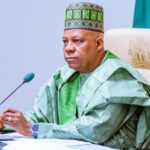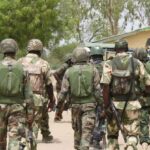Mark Obisesan’s legal representative has filed a motion against the Economic and Financial Crimes Commission (EFCC) seeking to prevent the organization from allegedly defaming his client’s character through publications in the press. The move comes after the Prosecuting Counsel, N.K. Ukoha, Esq, called three witnesses and concluded the case on Thursday, November 30, 2023. The trial has been adjourned to January 18, 2024, to allow the defense to present its case.
In the court documents, it is stated that the plaintiff, Mark Obisesan, discovered publications on the internet dated December 31, 2019, and December 6-7, 2023, allegedly published by the EFCC. These publications, marked as Exhibits A, B, C, and D, are said to contain information related to the ongoing charge before Justice Ijelu of the High Court of Lagos State, Ikeja Judicial Division.
The affidavit further claims that the EFCC’s publications could defame Mark Obisesan’s character in the eyes of the public, creating an impression of guilt even before the court delivers its judgment. The documents assert that such publications have been a recurring pattern since Obisesan’s arrest in 2019.
The legal action seeks to restrain the EFCC from making any further derogatory publications on the internet until the court concludes the hearing and delivers a judgment on the ongoing charge.
Reacting to suit, Mr Obisesan stated that “even before I was charged with any offense, the EFCC has splashed my mugshot all over the internet suggesting guilt before trial. Most painful is that this character assassination by the EFCC has cost my company sizable investment opportunities. It is a deliberate move by the commission to impugn my character, and it is unacceptable in a constitutional democracy where every accused is granted fair hearing. I am a victim of what I’m being accused of and I’m confident that I will prove my innocence in court. In the meantime, I would hope that the commission would refrain from trampling on my fundamental rights.”
In 2019, Mr. Obisesan was arrested and later charged to court for being in possession of counterfeit checks. He claimed he had no means of knowing if the check was forged and led the commission to the second defendant who he purchased the check from. The Second defendant has also corroborated Mr Obisesan’s of not being aware that the check was forged and claimed he also got the check from the third and fourth defendant who have no links to Mr Obisesan.
During cross examination of the witness, counsel to Mr. Obisesan asked if the witness could confirm the authenticity of a newly mint five hundred naira note. In his response, the witness claimed he lacked the tools to carry out the tests required to prove if the note was forged or authentic. Hence, Mr Obisesan’s counsel responded by telling the court that a technical process had to be undertaken to prove the authenticity of a local and familiar currency, so how was his client supposed to determine whether a foreign traveler’s cheque was forged with his bare eyes.
The judge admitted the five hundred naira note as evidence and adjourned the case till January.

 Join Daily Trust WhatsApp Community For Quick Access To News and Happenings Around You.
Join Daily Trust WhatsApp Community For Quick Access To News and Happenings Around You.



